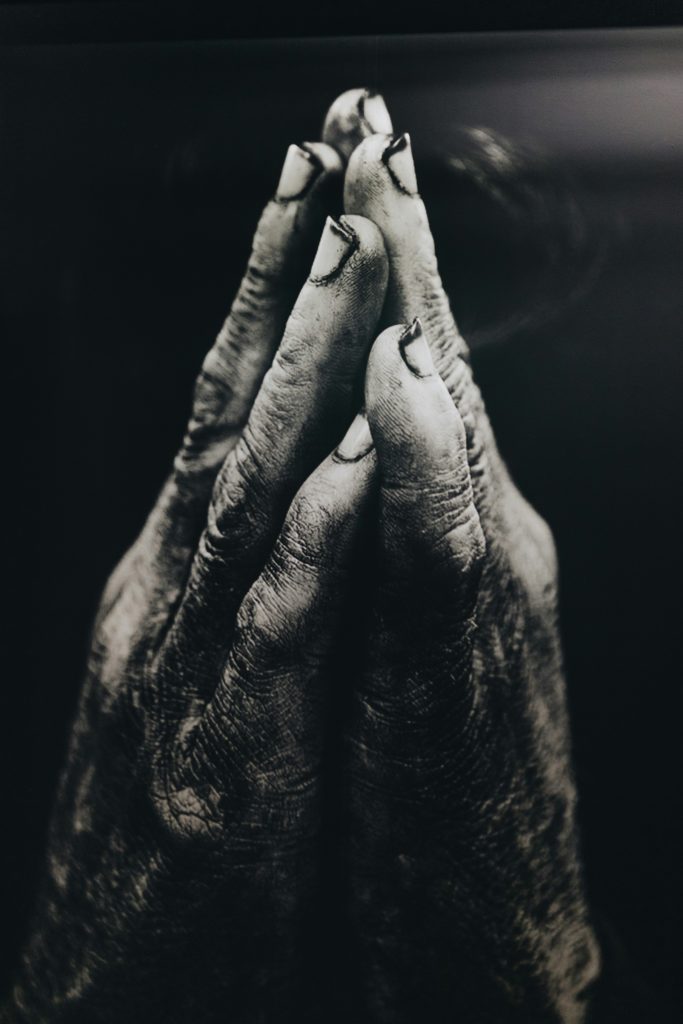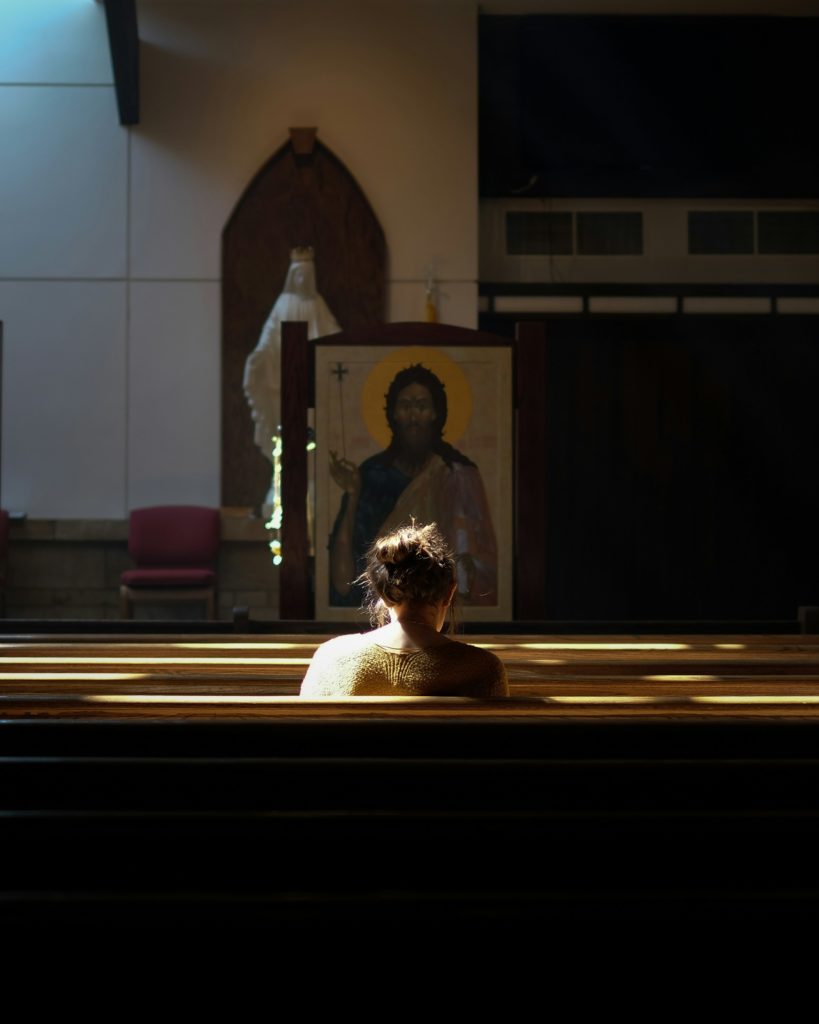
Morning prayer sparkles when the body is slow to stretch itself to honor this new day. The hand turns over the covers, summoned to wait for the revolution of the day to find a use again. Rejected, crumpled, they sag, overturned on the bed when the body stands up in the splendor of the dawning day. An eternal moment which reproduces itself as long as life flows through the veins and provides this breath whose absence rhymes with death. The body moves and embraces the darkness to slide on the mattress and let the feet touch the ground. Doesn't this ground wobble? Habit causes the room to become dark by denying it its mystery. The hand finds the pants and the sweater that will dress the clumsy body to regain movement when it had become accustomed to the stillness of the night. Suddenly, space has defined and precise volumes that are best not confronted with. Darkness watches over it so as not to lose its fortifications and hopes to regain some ground in its fight against daylight and against visual acuity which slowly adapts to the lack of light.
The corridor continues. It allows you to move towards the greatest adventure of the day. A few steps, and the corridor ends. The bathroom. A little bit of light. Very little. You have to wake up, but don't wake anyone. This meeting returns every morning around the world, intimate, without any display. The body discovers the dawning day, it leaves the night and its ocean of unconsciousness to bathe in the new source.
Finally, the prayer room. The little light that slides and reveals the triptych icon, a Virgin and Child, surrounded by the archangels Michael and Gabriel. A soft light like a setting Mediterranean sun. The kneeling descent on the prie-dieu reveals the moment of truth. Knees creak and beg for mercy. The muscular force deployed to descend onto the worn cushion placed on the wood of the prie-dieu allows the members to become familiar with this new position. Slouch while maintaining the dignity required by prayer. Let your gaze wander over the composite altar. Gaze at the woody light of the lamp on the cracked icon. See the face of Christ in this 19th century painting and his finger discreetly indicating his merciful heart. Recognizing the Trinity by Andrei Rublev. Think of the genius of Tarkovsky and all the fools-in-Christ. Let your mind wander like in an Antoine Blondin novel. Review this poorly signed contract, the chaos of work and human relations. Trying to ignore those creaky knees begging for comfort. Forget that phone call where each word sounded like a hammer blow. Let yourself be overcome by a few notes of despair about life after that horrible day the day before when all the work of several weeks was reduced to nothing. Regretting this fatigue which never ends and which longs to be swept away by a vacation which does not appear on the horizon... How so many thoughts turn and turn in the human skull which cannot stop tossing and cajoling its ideas, its concepts, this way of the world, the days past, those to come? What a marvel that these senses, all these visual or tactile or sound or taste or smell impressions come back and form the memory, where the spirit resides. What poetry!
The thoughts erase any pain from the knees or the osteoarthritis that sticks there like a shell to its rock. But, after the storm of memories and hopes, comes the time of hope and remembrance. It overflows memories and hopes by a hundred cubits, in depth, in length, in breadth, and in height. To tell the truth, it is very difficult to say how much it exceeds them, because there is nothing to compare them. The soul feels a wave of shock at the idea of this comparison. Nothing can be compared to hope and remembrance. It would be like comparing heaven to earth. That would not be appropriate. How can people who do not believe live like this, leaving out their souls? How can they cover them with so many artifices that they no longer resonate loudly enough to wake them? This is beyond comprehension.

Oration sifts and sifts the first ideas. Those that resonate and descend into a bottomless cavern. The ones that continue to resonate when we no longer hear them. Ideas from beyond the grave which modify everyday life, which influence and deepen it. In what time and space is life expressed? We believe it here and it is there. We think of it as distant, absorbed in theory, and practice wins the vote by embracing thoughts and actions. We are absent to ourselves. So often. In such a meaningful way. Let's leave you alone. And, if we succeed, if we allow ourselves to be absorbed by this dawn which tramples and groans, which gives birth to day and life, love arrives without warning and envelops us and embraces us. It is the fruit of prayer. There is a provoked moment that awaits us in spite of ourselves. From this moment, no one comes back the same. A moment from which we never really return. The beauty of this hand-to-hand combat from which only love emerges victorious orders the world. We would thus like to avoid it, because there is no time, there is so much to do, the seconds ricochet off one another, the world commands us and we are victims of our crumbling structure.
Sometimes too, when the thoughts dissipate, the waiting brings us to despair. The appointment is missed. A participant is kept waiting. Yet the mind demands it. We wait and we get impatient. We would come to look at the time. We stamp our feet. Until the moment we realize that it is not the right place, that we have made a mistake, that we have gone astray. From experience, we should know that if the appointment does not take place, it is never His fault, but ours. We did not make ourselves available. The only time in our lives when we must be absent to attend.
Never has the creature revealed itself as much of a creature. All weaknesses displayed. All fragilities exposed. Nothing protects anymore, because nothing could tarnish the moment. The day that slips away and merges with the night light. The furtive shadows that slide across the face of the Virgin. The sword of Saint Michael which shines ready to serve. The zertsilo of the Archangel Gabriel where Christ is reflected, indicating the way always to come, to imitate. All these thoughts, these emotions, these feelings nourish and feed each other, mindful of their importance. No order governs them. The immensity of what they reveal and the smallness of their container frighten, but also captivate. Everything that has been said, what is going to be said, what has not been said, what could have been said, is concentrated and extracted to be reduced to nothing. The prayer has only just begun. She announces herself. The eyes close. We grope our way into ourselves. There is a sanctuary there that is worrying. Will we find what we are looking for? “Lord, in the silence of this dawning day, I come to ask you for peace, wisdom and strength…” You have to come looking for nothing to find every new thing there. The words suddenly agonize. They are no longer up to the task. The prayer begins. She extinguishes everything that is not her, the silence. The depth of silence. The abysmal intensity of silence. The silence that completes everything in its presence. The silence that reigns for its master: love. Then begins prayer, when love unfolds and fills every vein, every organ, every fiber of the being to establish the precedence of the Creator over the creature. Nothing else exists. The heart flooded with joy. Nothing else can exist, because everything is incongruous when compared to this moment, which is neither a feeling, nor an emotion, nor a thought. The universe diminishes and becomes shorter. There is a moment which does not exist, but which will recur at the next abandonment. This is a moment that gives life all its importance. There, at the heart of prayer vibrates love, a jewel that we all have, but not by escaping, by abandoning ourselves. Nothing is taken for granted, everything is offered. Little by little, by no longer having access to it, we convinced ourselves that it did not exist or that it no longer existed. He did not resist science, we found, this new religion. We even ridiculed him, because it was not enough to forget him, we had to denigrate him. However, whoever allows himself to be captured there, transforms there, metamorphoses there. To refuse is to die slowly. Die to Him. Forever.
Prayer influences all life that is offered there by restoring to it its simplicity, the marvelous.
